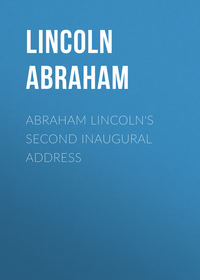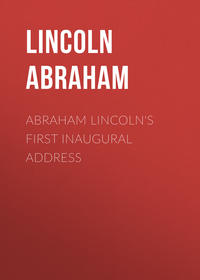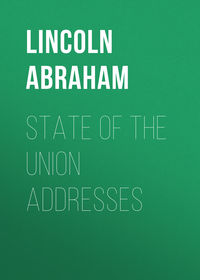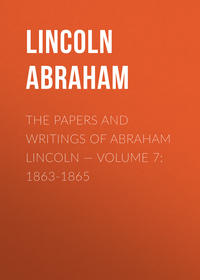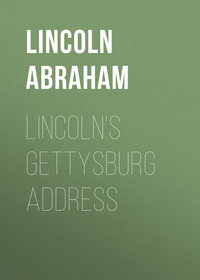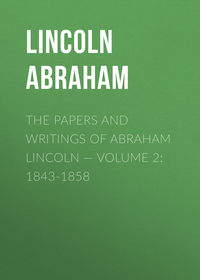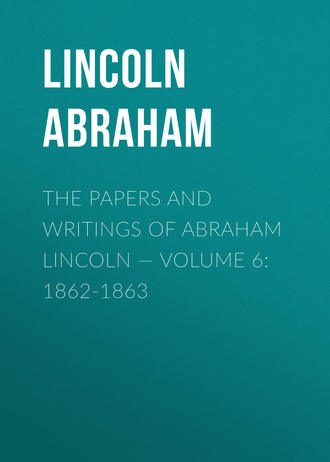 полная версия
полная версияThe Papers And Writings Of Abraham Lincoln — Volume 6: 1862-1863
Yours very truly,
A. LINCOLN.
TELEGRAM FROM GOVERNOR SEYMOUR
ALBANY, August 1, 1863. Recvd 2 P.MTO THE PRESIDENT OF THE UNITED STATES:
I ask that the draft be suspended in this State until I can send you a communication I am preparing.
HORATIO SEYMOUR.
TELEGRAM TO GOVERNOR SEYMOUR
WASHINGTON, D.C., August 1, 1863. 4 P.MHIS EXCELLENCY GOVERNOR SEYMOUR, Albany, N.Y.:
By what day may I expect your communication to reach me? Are you anxious about any part except the city and vicinity?
A. LINCOLN.
TELEGRAM TO GENERAL FOSTER
EXECUTIVE MANSION, WASHINGTON, August 3, 1863MAJOR-GENERAL FOSTER (or whoever may be in command of the military department with headquarters at Fort Monroe, Va.):
If Dr. Wright, on trial at Norfolk, has been or shall be convicted, send me a transcript of his trial and conviction, and do not let execution be done upon him until my further order.
A. LINCOLN.
TO GENERAL N. P. BANKS
EXECUTIVE MANSION, WASHINGTON, August 5,1863MY DEAR GENERAL BANKS:
While I very well know what I would be glad for Louisiana to do, it is quite a different thing for me to assume direction of the matter. I would be glad for her to make a new constitution, recognizing the emancipation proclamation, and adopting emancipation in those parts of the State to which the proclamation does not apply. And while she is at it, I think it would not be objectionable for her to adopt some practical system by which the two races could gradually live themselves out of their old relation to each other, and both come out better prepared for the new. Education for young blacks should be included in the plan. After all, the power or element of "contract" may be sufficient for this probationary period, and by its simplicity and flexibility may be the better.
As an antislavery man, I have a motive to desire emancipation which proslavery men do not have but even they have strong enough reason to thus place themselves again under the shield of the Union, and to thus perpetually hedge against the recurrence of the scenes through which we are now passing.
Governor Shepley has informed me that Mr. Durant is now taking a registry, with a view to the election of a constitutional convention in Louisiana. This, to me, appears proper. If such convention were to ask my views, I could present little else than what I now say to you. I think the thing should be pushed forward, so that, if possible, its mature work may reach here by the meeting of Congress.
For my own part, I think I shall not, in any event, retract the emancipation proclamation: nor, as executive, ever return to slavery any person who is free by the terms of that proclamation, or by any of the acts of Congress.
If Louisiana shall send members to Congress, their admission to seats will depend, as you know, upon the respective Houses, and not upon the President.
Yours very truly,
A. LINCOLN.
TO GOVERNOR SEYMOUR
EXECUTIVE MANSION, WASHINGTON, August 7, 1863HIS EXCELLENCY HORATIO SEYMOUR, Governor of New York:
Your communication of the 3rd instant has been received and attentively considered.
I cannot consent to suspend the draft in New York, as you request, because, among other reasons, time is too important.
By the figures you send, which I presume are correct, the twelve districts represented fall into two classes of eight and four respectively. The disparity of the quotas for the draft in these two classes is certainly very striking, being the difference between an average of 2200 in one class and 4864 in the other. Assuming that the districts are equal one to another in entire population, as required by the plan on which they were made, this disparity is such as to require attention. Much of it, however, I suppose will be accounted for by the fact that so many more persons fit for soldiers are in the city than are in the country who have too recently arrived from other parts of the United States and from Europe to be either included in the census of 1860, or to have voted in 1862. Still, making due allowance for this, I am yet unwilling to stand upon it as an entirely sufficient explanation of the great disparity.
I shall direct the draft to proceed in all the districts, drawing, however, at first from each of the four districts — to wit, the Second, Fourth, Sixth, and Eighth — only, 2200 being the average quota of the other class. After this drawing, these four districts, and also the Seventeenth and Twenty-ninth, shall be carefully re-enrolled; and, if you please, agents of yours may witness every step of the process. Any deficiency which may appear by the new enrolment will be supplied by a special draft for that object, allowing due credit for volunteers who may be obtained from these districts respectively during the interval; and at all points, so far as consistent with practical convenience, due credits shall be given for volunteers, and your Excellency shall be notified of the time fixed for commencing the draft in each district.
I do not object to abide a decision of the United States Supreme Court, or of the judges thereof, on the constitutionality of the draft law. In fact, I should be willing to facilitate the obtaining of it. But I cannot consent to lose the time while it is being obtained. We are contending with an enemy who, as I understand, drives every able-bodied man he can reach into his ranks, very much as a butcher drives bullocks into the slaughter-pen. No time is wasted, no argument is used. This produces an army which will soon turn upon our now victorious soldiers already in the field, if they shall not be sustained by recruits as they should be. It produces an army with a rapidity not to be matched on our side if we first waste time to re-experiment with the volunteer system, already deemed by Congress, and palpably, in fact, so far exhausted as to be inadequate; and then more time to obtain a court decision as to whether a law is constitutional, which requires a part of those not now in the service to go to the aid of those who are already in it; and still more time to determine with absolute certainty that we get those who are to go in the precisely legal proportion to those who are not to go. My purpose is to be in my action just and constitutional, and yet practical, in performing the important duty with which I am charged, of maintaining the unity and the free principles of our common country.
Your obedient servant,
A. LINCOLN.
TO GENERAL U.S. GRANT
EXECUTIVE MANSION WASHINGTON, August 9, 1863MY DEAR GENERAL GRANT:
I see by a despatch of yours that you incline quite strongly toward an expedition against Mobile. This would appear tempting to me also, were it not that in view of recent events in Mexico I am greatly impressed with the importance of re-establishing the national authority in western Texas as soon as possible. I am not making an order, however; that I leave, for the present at least, to the general-in-chief.
A word upon another subject: General Thomas has gone again to the Mississippi Valley, with the view of raising colored troops. I have no reason to doubt that you are doing what you reasonably can upon the same subject. I believe it is a resource which if vigorously applied now will soon close the contest. It works doubly, weakening the enemy and strengthening us. We were not fully ripe for it until the river was opened. Now, I think at least one hundred thousand can and ought to be rapidly organized along its shores, relieving all white troops to serve elsewhere. Mr. Dana understands you as believing that the Emancipation Proclamation has helped some in your military operations. I am very glad if this is so.
Did you receive a short letter from me dated the 13th of July?
Yours very truly,
A. LINCOLN.
TO GENERAL W. S. ROSECRANS
EXECUTIVE MANSION, WASHINGTON, August 10, 1863MY DEAR GENERAL ROSECRANS:
Yours of the 1st was received two days ago. I think you must have inferred more than General Halleck has intended, as to any dissatisfaction of mine with you. I am sure you, as a reasonable man, would not have been wounded could you have heard all my words and seen all my thoughts in regard to you. I have not abated in my kind feeling for and confidence in you. I have seen most of your despatches to General Halleck — probably all of them. After Grant invested Vicksburg I was very anxious lest Johnston should overwhelm him from the outside, and when it appeared certain that part of Bragg's force had gone and was going to Johnston, it did seem to me it was exactly the proper time for you to attack Bragg with what force he had left. In all kindness let me say it so seems to me yet. Finding from your despatches to General Halleck that your judgment was different, and being very anxious for Grant, I, on one occasion, told General Halleck I thought he should direct you to decide at once to immediately attack Bragg or to stand on the defensive and send part of your force to Grant. He replied he had already so directed in substance. Soon after, despatches from Grant abated my anxiety for him, and in proportion abated my anxiety about any movement of yours. When afterward, however, I saw a despatch of yours arguing that the right time for you to attack Bragg was not before, but would be after, the fall of Vicksburg, it impressed me very strangely, and I think I so stated to the Secretary of War and General Halleck. It seemed no other than the proposition that you could better fight Bragg when Johnston should be at liberty to return and assist him than you could before he could so return to his assistance.
Since Grant has been entirely relieved by the fall of Vicksburg, by which Johnston is also relieved, it has seemed to me that your chance for a stroke has been considerably diminished, and I have not been pressing you directly or indirectly. True, I am very anxious for East Tennessee to be occupied by us; but I see and appreciate the difficulties you mention. The question occurs, Can the thing be done at all? Does preparation advance at all? Do you not consume supplies as fast as you get them forward? Have you more animals to-day than you had at the battle of Stone's River? And yet have not more been furnished you since then than your entire present stock? I ask the same questions as to your mounted force.
Do not misunderstand: I am not casting blame upon you; I rather think by great exertion you can get to East Tennessee; but a very important question is, Can you stay there? I make no order in the case — that I leave to General Halleck and yourself.
And now be assured once more that I think of you in all kindness and confidence, and that I am not watching you with an evil eye.
Yours very truly,
A. LINCOLN.
TO GOVERNOR SEYMOUR
EXECUTIVE MANSION WASHINGTON, August 11.1863HIS EXCELLENCY HORATIO SEYMOUR, Governor of New York:
Yours of the 8th, with Judge-Advocate-General Waterbury's report, was received to-day.
Asking you to remember that I consider time as being very important, both to the general cause of the country and to the soldiers in the field, I beg to remind you that I waited, at your request, from the 1st until the 6th inst., to receive your communication dated the 3d. In view of its great length, and the known time and apparent care taken in its preparation, I did not doubt that it contained your full case as you desired to present it. It contained the figures for twelve districts, omitting the other nineteen, as I suppose, because you found nothing to complain of as to them. I answered accordingly. In doing so I laid down the principle to which I purpose adhering, which is to proceed with the draft, at the same time employing infallible means to avoid any great wrong. With the communication received to-day you send figures for twenty-eight districts, including the twelve sent before, and still omitting three, for which I suppose the enrolments are not yet received. In looking over the fuller list of twenty-eight districts, I find that the quotas for sixteen of them are above 2000 and below 2700, while, of the rest, six are above 2700 and six are below 2000. Applying the principle to these new facts, the Fifth and Seventh districts must be added to the four in which the quotas have already been reduced to 2200 for the first draft; and with these four others just be added to those to be re-enrolled. The correct case will then stand: the quotas of the Second, Fourth, Fifth, Sixth, Seventh, and Eighth districts fixed at 2200 for the first draft. The Provost-Marshal-General informs me that the drawing is already completed in the Sixteenth, Seventeenth, Eighteenth, Twenty-second, Twenty-fourth, Twenty-sixth, Twenty-seventh, Twenty-eighth, Twenty-ninth, and Thirtieth districts. In the others, except the three outstanding, the drawing will be made upon the quotas as now fixed. After the first draft, the Second, Fourth, Fifth, Sixth, Seventh, Eighth, Sixteenth, Seventeenth, Twenty-first, Twenty-fifth, Twenty-ninth, and Thirty-first will be enrolled for the purpose and in the manner stated in my letter of the 7th inst. The same principle will be applied to the now outstanding districts when they shall come in. No part of my former letter is repudiated by reason of not being restated in this, or for any other cause.
Your obedient servant,
A. LINCOLN.
TO GENERAL J. A. McCLERNAND
EXECUTIVE MANSION, WASHINGTON, August 12, 1863MAJOR-GENERAL McCLERNAND.
MY DEAR SIR: — Our friend William G. Greene has just presented a kind letter in regard to yourself, addressed to me by our other friends Yates, Hatch, and Dubois.
I doubt whether your present position is more painful to you than to myself. Grateful for the patriotic stand so early taken by you in this life-and-death struggle of the nation, I have done whatever has appeared practicable to advance you and the public interest together. No charges, with a view to a trial, have been preferred against you by any one; nor do I suppose any will be. All there is, so far as I have heard, is General Grant's statement of his reasons for relieving you. And even this I have not seen or sought to see; because it is a case, as appears to me, in which I could do nothing without doing harm. General Grant and yourself have been conspicuous in our most important successes; and for me to interfere and thus magnify a breach between you could not but be of evil effect. Better leave it where the law of the case has placed it. For me to force you back upon General Grant would be forcing him to resign. I cannot give you a new command, because we have no forces except such as already have commanders.
I am constantly pressed by those who scold before they think, or without thinking at all, to give commands respectively to Fremont, McClellan, Butler, Sigel, Curtis, Hunter, Hooker, and perhaps others, when, all else out of the way, I have no commands to give them. This is now your case; which, as I have said, pains me not less than it does you. My belief is that the permanent estimate of what a general does in the field is fixed by the "cloud of witnesses" who have been with him in the field, and that, relying on these, he who has the right needs not to fear.
Your friend as ever,
A. LINCOLN.
TELEGRAM TO GOVERNOR SEYMOUR
EXECUTIVE MANSION, WASHINGTON, AUGUST 16, 1863GOVERNOR SEYMOUR, New York:
Your despatch of this morning is just received, and I fear I do not perfectly understand it.
My view of the principle is that every soldier obtained voluntarily leaves one less to be obtained by draft. The only difficulty is in applying the principle properly. Looking to time, as heretofore, I am unwilling to give up a drafted man now, even for the certainty, much less for the mere chance, of getting a volunteer hereafter. Again, after the draft in any district, would it not make trouble to take any drafted man out and put a volunteer in — for how shall it be determined which drafted man is to have the privilege of thus going out, to the exclusion of all the others? And even before the draft in any district the quota must be fixed; and the draft must be postponed indefinitely if every time a volunteer is offered the officers must stop and reconstruct the quota. At least I fear there might be this difficulty; but, at all events, let credits for volunteers be given up to the last moment which will not produce confusion or delay. That the principle of giving credits for volunteers shall be applied by districts seems fair and proper, though I do not know how far by present statistics it is practicable. When for any cause a fair credit is not given at one time, it should be given as soon thereafter as practicable. My purpose is to be just and fair, and yet to not lose time.
A. LINCOLN
To J. H. HACKETT
EXECUTIVE MANSION, WASHINGTON August 17, 1863JAMES H. HACKETT, Esq.
MY DEAR SIR: — Months ago I should have acknowledged the receipt of your book and accompanying kind note; and I now have to beg your pardon for not having done so.
For one of my age I have seen very little of the drama. The first presentation of Falstaff I ever saw was yours here, last winter or spring. Perhaps the best compliment I can pay is to say, as I truly can, I am very anxious to see it again. Some of Shakespeare's plays I have never read, while others I have gone over perhaps as frequently as any un-professional reader. Among the latter are Lear, Richard III., Henry VIII., Hamlet, and especially Macbeth. I think nothing equals Macbeth. It is wonderful.
Unlike you gentlemen of the profession, I think the soliloquy in Hamlet commencing "Oh, my offense is rank," surpasses that commencing "To be or not to be." But pardon this small attempt at criticism. I should like to hear you pronounce the opening speech of Richard III. Will you not soon visit Washington again? If you do, please call and let me make your personal acquaintance.
Yours truly,
A. LINCOLN
TO F. F. LOWE
WASHINGTON, D. C., August 17, 1863HON. P. F. LOWE, San Francisco, Cal.:
There seems to be considerable misunderstanding about the recent movement to take possession of the "New Almaden" mine. It has no reference to any other mine or mines.
In regard to mines and miners generally, no change of policy by the Government has been decided on, or even thought of, so far as I know.
The "New Almaden" mine was peculiar in this: that its occupants claimed to be the legal owners of it on a Mexican grant, and went into court on that claim. The case found its way into the Supreme Court of the United States, and last term, in and by that court, the claim of the occupants was decided to be utterly fraudulent. Thereupon it was considered the duty of the Government by the Secretary of the Interior, the Attorney-General, and myself to take possession of the premises; and the Attorney-General carefully made out the writ and I signed it. It was not obtained surreptitiously, although I suppose General Halleck thought it had been, when he telegraphed, simply because he thought possession was about being taken by a military order, while he knew no such order had passed through his hands as general-in-chief.
The writ was suspended, upon urgent representations from California, simply to keep the peace. It never had any direct or indirect reference to any mine, place, or person, except the "New Almaden" mine and the persons connected with it.
A. LINCOLN.
TELEGRAM TO GENERAL MEADE
EXECUTIVE MANSION, WASHINGTON, August 21, 1863MAJOR-GENERAL MEADE, Warrenton, Va.:
At this late moment I am appealed to in behalf of William Thompson of Company K, Third Maryland Volunteers, in Twelfth Army Corps, said to be at Kelly's Ford, under sentence to be shot to-day as a deserter. He is represented to me to be very young, with symptoms of insanity. Please postpone the execution till further order.
A. LINCOLN.
TELEGRAM TO GENERAL SCHOFIELD
WASHINGTON, D. C., August 22, 1863GENERAL SCHOFIELD, Saint Louis, Mo.:
Please send me if you can a transcript of the record in the case of McQuin and Bell, convicted of murder by a military commission. I telegraphed General Strong for it, but he does not answer.
A. LINCOLN.
TELEGRAM TO MRS. GRIMSLEY
WAR DEPARTMENT, WASHINGTON, D. C., August 24, 1863MRS. ELIZABETH J. GRIMSLEY, Springfield, Ill.:
I mail the papers to you to-day appointing Johnny to the Naval school.
A. LINCOLN
TO CRITICS OF EMANCIPATION
To J. C. CONKLINGEXECUTIVE MANSION, WASHINGTON, August 26, 1863.
HON. JAMES C. CONKLING.
MY DEAR SIR: — Your letter inviting me to attend a mass meeting of unconditional Union men, to be held at the capital of Illinois, on the 3d day of September, has been received. It would be very agreeable for me thus to meet my old friends at my own home, but I cannot just now be absent from here so long as a visit there would require.
The meeting is to be of all those who maintain unconditional devotion to the Union, and I am sure that my old political friends will thank me for tendering, as I do, the nation's gratitude to those other noble men whom no partisan malice or partisan hope can make false to the nation's life.
There are those who are dissatisfied with me. To such I would say: You desire peace, and you blame me that we do not have it. But how can we obtain it? There are but three conceivable ways:
First — to suppress the rebellion by force of arms. This I am trying to do. Are you for it? If you are, so far we are agreed. If you are not for it, a second way is to give up the Union. I am against this. Are you for it? If you are you should say so plainly. If you are not for force nor yet for dissolution, there only remains some imaginable compromise.
I do not believe that any compromise embracing the maintenance of the Union is now possible. All that I learn leads to a directly opposite belief. The strength of the rebellion is its military, its army. That army dominates all the country and all the people within its range. Any offer of terms made by any man or men within that range, in opposition to that army, is simply nothing for the present; because such man or men have no power whatever to enforce their side of a compromise, if one were made with them.
To illustrate: Suppose refugees from the South and peace men of the North get together in convention, and frame and proclaim a compromise embracing a restoration of the Union. In what way can that compromise be used to keep Lee's army out of Pennsylvania? Meade's army can keep Lee's army out of Pennsylvania, and, I think, can ultimately drive it out of existence. But no paper compromise to which the controllers of Lee's army are not agreed can at all affect that army. In an effort at such compromise we would waste time, which the enemy would improve to our disadvantage; and that would be all.
A compromise, to be effective, must be made either with those who control the rebel army, or with the people, first liberated from the domination of that army by the success of our own army. Now allow me to assure you that no word or intimation from that rebel army, or from any of the men controlling it, in relation to any peace compromise, has ever come to my knowledge or belief. All charges and insinuations to the contrary are deceptive and groundless. And I promise you that if any such proposition shall hereafter come, it shall not be rejected and kept a secret from you. I freely acknowledge myself to be the servant of the people, according to the bond of service, the United States Constitution, and that, as such, I am responsible to them.


